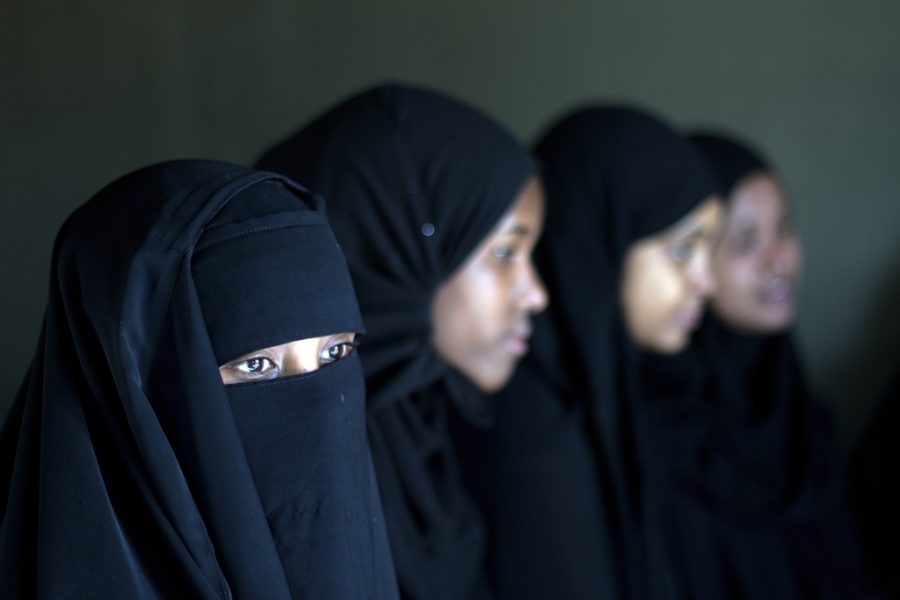Why Feminism is Needed: Women’s Lives Still Greatly Limited
December 13, 2017
As women in America continue to fight for true equality, we are lucky enough to no longer have to fight for basic rights. There have been many strong and courageous American women who have fought and protested in order to secure the rights that women in this country have today. Although the issues women currently face in America in terms of social equality — like objectification, stereotypes, and rape culture — are far from solved, women in countries around the world are still fighting for those basic rights.
This is why feminism is needed.
Women in many other countries are not able to participate in daily life in the same way that men are. Those women need people to help them fight so they can be able to enjoy their lives, free from the oppression they face simply because they are female. To get a better sense of the seriousness of this problem, here is a look at three countries in particular where women experience unjust treatment and inequality everyday.
Saudi Arabia
Imagine being an adult, and still needing permission for anything you want to do. In Saudi Arabia, this is the case for women. Under the male-guardianship system, women must have a male guardian, who could be their father, brother, husband or son, to make major and often even simple decisions for her. Women need permission before they can travel, get medical treatment, work, go to school, or leave their house.
This means that women’s lives are strictly controlled by the man who is in charge of them, and that they often are not able to do what they want to do simply because their male guardian doesn’t feel like saying yes.
Another issue women face in Saudi Arabia is child marriage. Because there is no law stating how old a girl must be before she can get married, girls under the age of 15 often have to be married to men in their sixties. On top of just being gross, this gives girls no chance to be children or to have any sort of childhood.
While there is very little equality for women in Saudi Arabia, there has been some progress recently. Women have never been able to drive themselves; however, after years of protesting and fighting this law, women will finally be able to drive in June of 2018. While it is ridiculous that women in some other countries haven’t been allowed to drive on their own until now, this is at least a positive sign that the monarchy is moving in the right direction.
Honduras
Experiencing violence and assault is part of everyday life for many women in Honduras. With the highest murder rate in the world per capita for a country not at war, women are the main target of violence and aggression from men. The “femicide” rate is the highest in the world, where one woman is murdered every 16 hours. As a result Honduras is often named as the most dangerous place to be a woman.
Men in Honduras generally have the power to do whatever they want to women, without much fear of punishment from law enforcement. Due to a lack of resources, law enforcement doesn’t always have the ability to properly protect people, especially women. Many cases of domestic violence, assault, and murder go unrecognized or aren’t investigated because just filing a complaint can take up to two weeks. Some neighborhoods are so unsafe that police officers cannot enter without military backup, making violence common and leaving people without help while in a situation where they really need it.
In Honduras, this kind of violence towards women is normal, and to most people is accepted. The society has reduced women to being subject to whatever harm is brought to them by men, who can assault, hurt and murder women while never receiving any punishment for these crimes. In Honduras men are considered superior, and their actions reflect the flawed views of their society.
Yemen
Women in Yemen experience the struggles that come with living in a country with one of the largest gender gaps. Yemen has been ranked the country with the least gender equality, due to the large gap between men and women in their opportunities to participate in society, education, health, and politics.
With limited access to health care, women in Yemen do not get the necessary medical care they often need. Since women cannot make their own medical decisions, they have to wait for the permission of a man, often leaving them without the necessary treatment they need at that time.
Because of the poor medical care provided for women in Yemen, the maternal mortality rate is alarmingly high. It is common for a woman in Yemen to experience more than 10 pregnancies in her life, and to have no medical assistance when giving birth. Since these women are not able to advocate for themselves and make their own medical choices, they are not able to do what they feel is in the best interest of their health.
Yemen has one of the biggest gaps in education between men and women, with only half of girls attending primary school, and 2 out of 3 women in Yemen being illiterate. This makes it extremely difficult for women to get jobs, or take up any roles in society outside of being a mother. This is largely due to the poor economy Yemen faces. Families will usually end up budgeting their money to send their sons to school over their daughters.
As a result of this extreme gap between men and women’s basic academic and social abilities, women are debilitated from doing anything other than what is expected of them. Even if they had the permission from their male guardian to be independent, the male dominated society would still hold them back.
***
Although feminism often seems to be confined to the stereotype of “man hating”, the truth is that it is far from that. Without feminism, women in America still would not be able to vote, serve in the military, or have the same jobs as men. Although Americans have reached that point, there are women in other countries still struggling to live without having their gender limit them.
It has been proven throughout history that when people band together to fight for a change, sooner or later that change often happens. It is obvious that the way women in these other countries must live is unfair and unsafe.
It will take many voices to one day make a change, but the more people who recognize this issue, the closer these women will be to achieving equality.
In addition to raising awareness to the issues women face around the world, this effort involves work here at home, where much has been accomplished, but where there is still much left to be done.
Creative Commons photo source: https://www.flickr.com/photos/unicefethiopia/14280738594/





